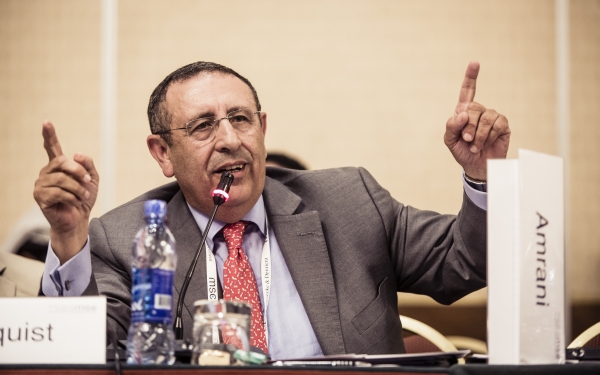
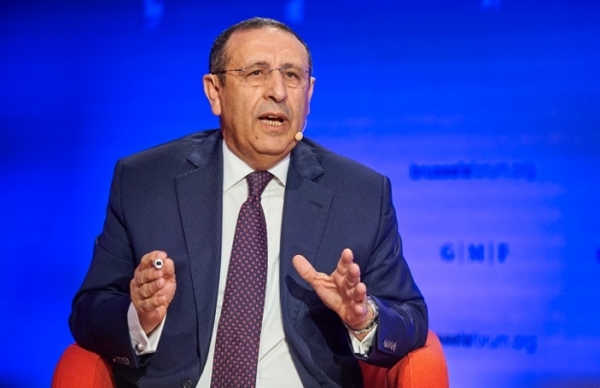
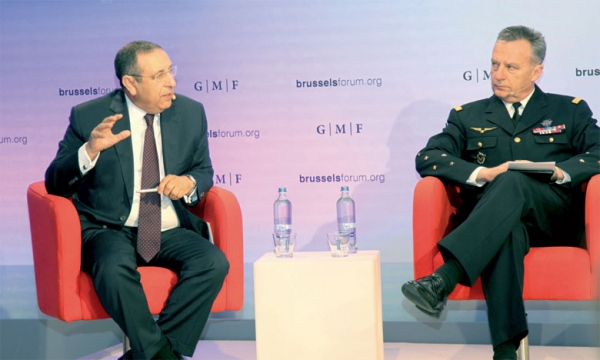
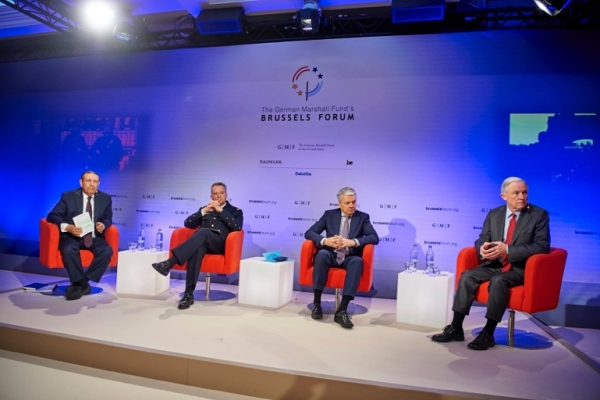
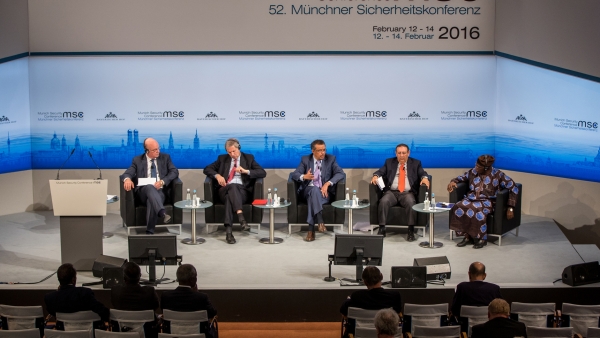
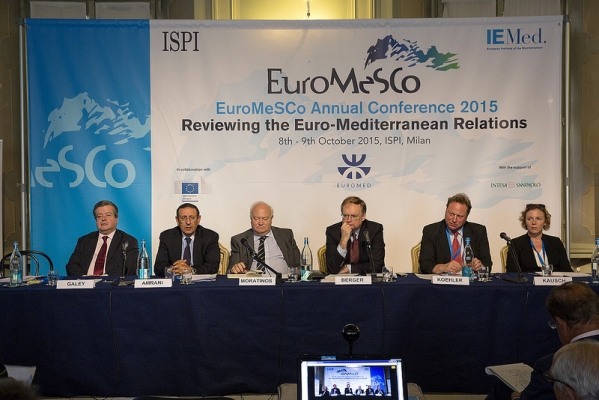
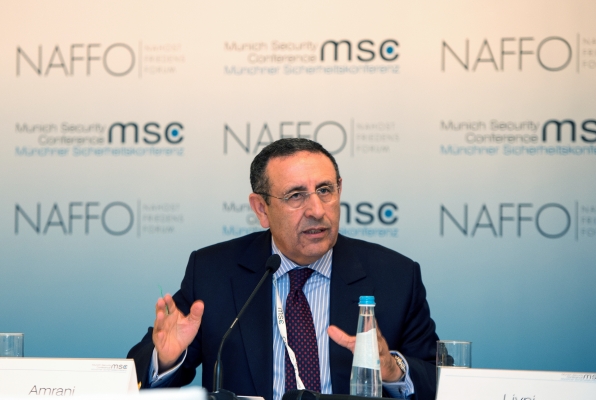
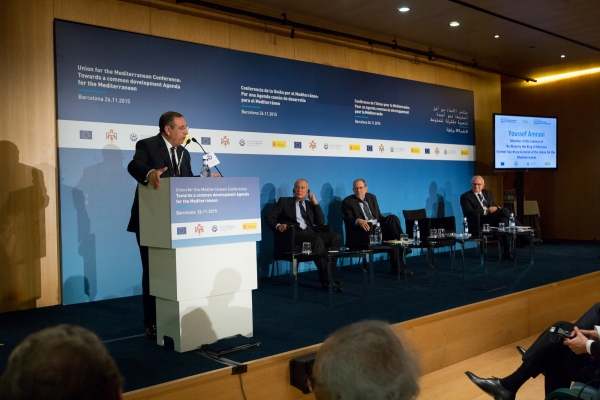
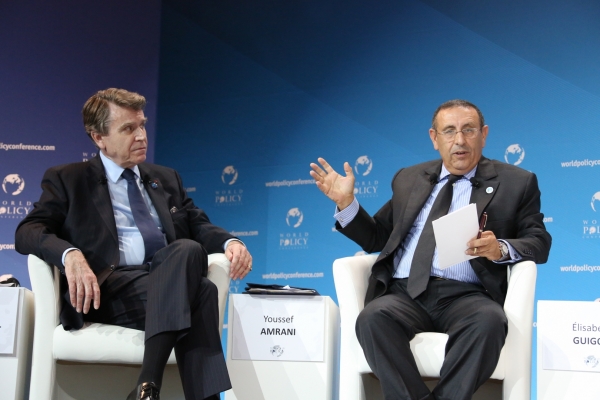
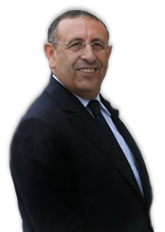

In a context of change, turbulences and violence, Moroccan diplomacy under His Majesty the King has never ceased to appease, to regulate and to strengthen relations with partners and neighbours, but also to anticipate avoiding and preventing the “clashes of civilizations”.
In a geopolitical world that is becoming increasingly complex, it was necessary to ensure overall coherence between internal and external actions, protect the interests of the country and ensure more visibility and influence in a spirit of responsibility and solidarity.
This is the path proposed at the highest rank of the state. Based on these «fundamentals», how has Moroccan diplomacy evolved? How has it been redesigned? We have asked the question to a seasoned diplomat, Youssef Amrani, who, before resigning from his position, following the decision of the central committee of the Istiqlal party, had spent 35 years serving Moroccan diplomacy and has climbed the ranks of a demanding profession, which he describes as having its limitations, peculiarities, and privileges.
Designated repeatedly as Ambassador in Latin America, Director at the Ministry, Secretary General of the Union for the Mediterranean, and Delegate Minister, he delivers us a reasoned analyses of the evolution of Moroccan Diplomacy, highlighting a base line: His Majesty’s commitment to the promotion of peace and peaceful resolutions to conflicts.
Le Matin: In the next step of your personal journey, which is full of decades of teaching and observation of international politics, what are your opinions on the evolution of Moroccan diplomacy in general; that of long time cooperation, exchanges, partnerships, those of global diplomacy that deal with questions affecting all the countries such as the distribution of water, energy, pandemics…and multilateral diplomacy?
Youssef Amrani: On the regional and international level, Morocco is distinguished by its pro-active approach, its solidarity and unwavering commitment to the promotion of dialogue and peace. His Majesty the King has made an irreversible choice: that of constructing a modern democratic state, open to the world and respectful to the universal values of human rights. In foreign policy, he opted for a triptych: the maintenance of peace, the development of cooperation and the promotion of universal values. In that respect, multilateral diplomacy is a principal axis. Morocco’s election to the Security Council for the 2012-2013 year is a testament to the confidence placed in it by the UN Member States. Out of the 193 votes, Morocco won 151 to its favour! We are talking about an overwhelming majority. This is exactly where the force of Morocco resides. Our country is a reliable partner, with the ability to build compromise and generate consensus.
Our country is a strong supporter of cooperation as a means of development. The vision of His Majesty for a common future of the Great Maghreb is rooted in this belief. It is vital for us to build our common Maghreb area, especially since we dispose of all the human and technical tools to achieve it. The opposite would be an irresponsible waste. As for the second part of your question, I think that diplomacy of the twenty first century is that of global questions. With globalization, the issues are globalized and call for a concerted global action. Our country is actively engaged in dealing with global issues which the entire international community faces. The maintenance of peace is the leitmotif of Moroccan foreign policy. In the aftermath of its independence, Morocco contributed for the first time to a peacekeeping operation in the Congo with the ONUC mission. Even today, our country continues to be an important player in peacekeeping, participating in current peacekeeping missions, such as the MONUSCO and the ONUCI in Africa and KFOR in Europe.
A Social Project
The last decade in Morocco has been marked by two initiatives that are real social projects, namely the autonomy plan for the Sahara and ALECA which comes to build on advanced Status with the EU. Where are we with the first initiative of the autonomy plan in the Sahara?
Youssef Amrani: I would like to underline a key word in your question; social project. Indeed, His Majesty the King has initiated ever since his accession to the throne, the foundations of a modern and democratic project through unprecedented reforms and credible initiatives. It is this social project, defined and driven by His Majesty the King that has allowed us to defend serenely our interests and to advantageously position us in both the regional and international scenes as an active partner; respected, listened to and fully committed to peace and international security. To go back to your question, it is essential to clarify that the two initiatives mentioned are not the result of chance. They are a logical emanation of this social project initiated by His Majesty the King, privileging values of modernity, openness, dignity, and compromise. Regarding the initiative for autonomy, it is clear that since its presentation in 2007, not only has the handling of the issue known a re-newed dynamic after a long period of enlistment and absence of clear perspectives, but our position has been strengthened through tangible achievements on a regional level, international level, and through the receptivity of great powers to the Moroccan approach. Let us not forget that the pertinent resolutions of the Security Council and the various reports of the Secretary-General explicitly and unequivocally recognize the relevance and prominence of the Moroccan Autonomy Plan. These achievements are closely related to the strengths of the autonomy plan, which include substantive content, a consultation process that has led to its conception and development, and its compliance with international law. These are assets that have led the United Nations and the international community to qualify the project as serious, credible and realistic, considering its ability to ensure the progress and the well being of the populations and the democratic management of their local affairs. To summarize, this initiative provides a solid basis for reaching a permanent political solution to the dispute, moving beyond outdated approaches.
A case monitored directly and with a lot of vigilance by his Majesty the King, where his role is crucial in certain moments of crisis?
I would say that the actions, procedures and contacts initiated by His Majesty the King have played critical roles for positive developments of the issue. To illustrate my point, I will cite two examples: the first dates back to August 25th, the date of the conversation between His Majesty the King and Ban Ki-moon, the Secretary General of the United Nations. This telephone conversation created a new dynamic and has allowed certain things to be clarified, especially with regards to the MINURSO mandate, the respect of the parameters of the political process, the nature of the Personal Envoy’s mission, and also the importance of bilateral relations with Algeria. The second example of His Majesty’s leadership and engagement is demonstrated by the adoption of Resolution 2099 by the Security Council on April 2013. This resolution precisely confirms the Moroccan position thanks to the decisive leadership of His Majesty the King and to his personal exchanges with influential actors in the international community. Furthermore, I would like to take this opportunity to respond to those who do not hesitate to exploit the noble principles of human rights in the southern provinces. This resolution should remind them how the UN welcomes and explicitly recognizes the scope and importance of reforms and decisions for the promotion and protection of human rights undertaken by Morocco under the leadership of His Majesty the King, in addition to strengthening the action of the CNDH in Dakhla and Laayoune and the interaction of the Kingdom with the UN Council of Human Rights Special Procedures.
Sahel: A new geopolitical map
With the crisis of the Sahel in general and of Mali in particular, have you noticed any changes on the question of the Sahara, especially from the Algerian side?
Indeed, the situation in the Sahel region has made us conscious of the real dangers linked to the upsurge of the security threat and challenge, after many years of certain parties turned on a deaf ear, and in the best scenarios, favouring a narrow approach. This situation has led to a new reality with a geopolitical and geo-strategic map that requires a more and more rapid and urgent resolution of the Sahara dispute. To summarize, everybody shares the opinion that the status quo is unsupportable and that a new approach conform to the guidelines set by the Security Council is required when dealing with the Sahara issue. This was stressed by Mr. Ross during the briefing he had with the Security Council last November 28th, 2012. There is also a shared belief by the Security Council that considers, under the resolution 2099, that the persistence of the status quo is unacceptable. This is a clear invitation to the other parties to facilitate and accelerate the settlement of the Sahara issue by acting in good faith and without delay to encourage stability and integration of the Greater Maghreb. In addition, the other parties have to demonstrate accountability and end their attempts of bypassing the UN led political process. Concerning the relations with Algeria, it is important to note that Morocco has always advocated the normalization of bilateral relations in the context of good neighborhood policy and mutual respect. We also encourage a new Maghreb order, which would, as highlighted by His Majesty the King Mohamed VI in the royal speech addressed to the nation on November 6th 2012, stabilize and secure the Sahel-Sahara zone in addition to being an important actor in structuring African integration.
Algeria is expected to engage itself in good faith to reach a permanent political solution to the Sahara issue by putting in effort. It is not a simple wish, but a genuine request by the Security Council resolution 2099, which explicitly asks the neighboring states to cooperate more with the United Nations and with each other. The same UN text emphasizes the importance of cooperation between the countries of the Arab Maghreb Union and encourages Algeria to maintain its dialogue with the UNHCR concerning the census of the population in the Tindouf camps.
A change of archetype with Europe?
What about our relationship with Europe which involve new regional geopolitics?
I consider that the petition launched by His Majesty the King for the emergence of an advanced status was a fundamental element for the birth of an exemplary partnership model between Morocco and the European Union. This initiative, led by His Majesty the King, has allowed us to operate, and I weigh my words, a true generational leap in terms of philosophy, architecture and tools for our multifaceted relations with Europe. Allow me to explain: the adoption of the advanced status has allowed us to expand the horizon of our relations with Europe beyond a simple « logic of free trade » in order to achieve a greater integration of Moroccan political, economic and social structures with those of the European Union. In my opinion, this is a genuine change of the archetype imposed on Europe and Morocco due to the advanced status, as desired by his Majesty the King. The objective is to build the foundations for a common economic space between Morocco and Europe. This common space will symbolize the improvement of the attractiveness and the overall competitiveness of the Moroccan economy. In addition, this common space will also be a key driver in consolidating the process of modernization of the institutional and regulatory structures of Morocco, in parallel with the far-reaching reforms driven by his Majesty the King. To set the record straight: the advanced status is the equivalent of running a « membership tailored » to the « four freedoms » of the European internal market, through a transfer of European policy towards Morocco.
Allow me to diverge from the subject: I recently hosted a brainstorming session with some officials of the Ministry regarding the evolution of our relations with the EU. I called on the skills that have contributed to the conclusion of the Association Agreement in 1966 and on those who participated in the negotiations of the Advanced Status in order to encompass an ample analysis and perspective. We have realized that, beyond the courses of action and projection highlighted in our brainstorming session, the whole “language” and registry of our relations with Europe have been transformed in the sense that we no longer talk about «tariffs, tariff reduction, reference price ». Instead we talk about «standards, non-tariff obstacles, trade facilitation, intellectual property, and competition»; themes that perfectly illustrate the generational leap induced by the advanced status. I am aware that achieving an advanced status in its full dimensions will not be an easy task, only because the evolving nature of strategic objectives, that some may qualify as ‘moving targets’. We must, in the future, surpass the gamble of regulatory convergence and move towards community ‘acquis’, which is a prerequisite for the emergence of a homogeneous and complementary space, guided by principles and conform rules between Morocco and the European Union. I stress the fact that this regulatory convergence is not a simple technical operation, and will require transposing systems, values, and ways of thinking that will need to be conditioned and adapted to the Moroccan reality. That is why we need to opt for a gradual, sectional and sequent approach that will allow us to work on two essential preoccupations. The first being the necessity of taking into consideration our absorption capacity of the community ‘acquis’, and secondly, creating intelligent synergies between regulatory integration and Moroccan public policy in order to ensure the sustainability and legitimacy of the reforms. That is the spirit that is guiding the recent negotiations launched for the conclusion of a full agreement of free trade; first of its kind in the Mediterranean area. That said, I am convinced, along with the European Union as well, that we dispose of a common strategic desire and of instruments and operational modes necessary to crystallize the ambitious perspective that Morocco aspires to have in its relations with Europe. This ambitious perspective is naturally meant to be a source of positive emulation for the countries south of the Mediterranean, in a regional environment that is marked by great uncertainty.
Deep and old ties with Africa
Other inflections have marked the evolution of diplomacy of the Moroccan Kingdom: strengthening relations with Africa and the Gulf countries. What policy underlines these choices?
As you know, all policies are above all an expression of a vision. The vision of His Majesty King Mohammed VI for Africa is based on a clear premise: Morocco, as an African country, has a natural tendency to develop its relations with its brethren African countries, with whom we are bound to in history, geography, the challenges we face together, and a common cultural and civilization patrimony which we are responsible for preserving and nurturing. These rich and deep links are the lifeblood of the African policy of our Kingdom, which mainly focuses on three specific and complementary axes. These axes are namely the duty of solidarity, the imperative of shared growth and the promotion of peace and security. In recent years, the foreign policy of our Kingdom towards Africa has intensified through the strengthening of these three lines of action. Regarding the duty of solidarity, cooperation programs initiated by Morocco experienced a significant expansion and dynamism due to the substantial increase in the number of recipient countries and the diversification of forms of support. Without being exhaustive, I would simply say that Morocco has worked to implement many development projects in several African countries in areas such as health, agriculture, and artificial rain, the management of water resources, irrigation, locust, electrification, and development of basic infrastructure, education and training among many other things. Morocco’s solidarity is also displayed in humanitarian aid granted to countries affected by natural disasters and conflicts (wheat donations, medicine, medical equipment, field hospitals …).
The need for shared growth, while converging with our interdependent approach, is founded on the conviction that our success can be only achieved collectively. We reject the fatalistic theses on Africa; instead we believe that our continent has all the necessary resources to achieve a successful economic growth and to respond to the needs and aspirations of its population. In this context, it is essential to seize the many opportunities available to us in further developing our respective capabilities and sharing our experiences and expertise in order to better exploit the potential synergies in all areas. This win-win partnership requires a shared willingness to deepening the South-South cooperation, moving away from all maneuvers or any narrow political calculations, given the real issues and challenges, which can only be surpassed by working together with in a spirit of shared responsibility and political pragmatism. The diplomatic efforts of our Kingdom are based on this conviction, determination and pragmatism. It is reflected in particular by an active commitment to the promotion of a bold, creative, and multidimensional South-South cooperation.
The third pillar of our foreign policy vis-à-vis Africa consists of our ongoing commitment to the promotion of peace and security on the continent. This is made clear by the various diplomatic efforts Morocco carries out in sub-regional and international bodies, particularly UN bodies. Elected as non-permanent UN member for Africa in the Security Council, our Kingdom spares no effort to promote peace, security and stability on the African continent. The leading role played by the Moroccan diplomacy on the issue of the crisis in Mali or the participation of Moroccan troops in African peacekeeping operations illustrate this constant commitment and recognition of the Kingdom.
To go back to your question, I would say that it is a reaffirmation of our consistent policy for Africa through the strengthening of the three pillars of our African diplomacy, according to the vision and guidance of His Majesty the King. This is precisely what has emerged from the recent visit of His Majesty in West Africa last March, which stressed on renewed relations of Morocco with its African partners, opening new prospects for cooperation and dynamics, providing strategic leadership to the rich and old ties that bind us to our African brothers.
Concerning relations with the United Gulf countries, the decision in 2012 to establish a strategic partnership with the states of the Gulf Cooperation Council is part of our continued diplomatic effort towards these states and the need for an evolution of a more demanding and ambitious cooperation, in line with the current issues and challenges as well as ones we may face in the future. As you know, our country boasts of close and exceptional relations at the highest level with these states. These relations are characterized by a strong and sustainable understanding in addition to a strong Arab brotherhood based on sincerity. The vision of His Majesty the King regarding the relations with the GCC is based on these privileged relations and on the determination of our country to adapt innovative mechanisms, which are constantly shifting and increasingly complex, at a regional and international context. The strategic partnership with the GCC meets this objective by establishing a new regional dimension to the existing frameworks for bilateral cooperation, which will open up new areas of cooperation. Official visits by his Majesty the King in 2012 to Saudi Arabia, Qatar, UAE and Kuwait have laid the groundwork for this multidimensional mutually beneficial partnership. One concrete manifestation was the announcement of the establishment of a mechanism to support development projects in Morocco, with a budget of $ 5 billion over a period of 5 years (2012-2016).
Our relations with the United States appear to have stalled. What do you think about this relationship?
Contrary to what you may seem to believe, our bilateral relations with the United States have been more extensive in the past two years under the combined leadership of His Majesty King Mohammed VI and the U.S. In 2012, the launch of the Strategic Dialogue with the United States and the invitation extended to His Majesty the King by President Obama for an official visit in Washington before the end of this year, highlight the constant evolution of our relations for nearly two centuries now. Our two countries are also tied geographically since we both share the Atlantic Ocean area, linked by a foundation of shared values, and common challenges that we face together. The convergence of views between Morocco and the United States on regional and international issues, including the preservation and consolidation of peace in the international and regional level, the respect for the sovereignty and territorial integrity of States add to this close proximity, hence forging a friendship based on mutual trust and respect for each others vital interests. The depth and strength of our strategic partnership is forged in a rich and solid crucible, and emerges from ties that transcend ideological and partisan considerations, giving the relationship a unique, special and lasting character.
The launch of the Strategic Dialogue the 13th September 2012 has strengthened the institutional framework of our cooperation through the creation of new instruments of innovative cooperation. The second session of the Strategic Dialogue, which was held in Rabat, gathered both the Political and Security working groups during the recent visit to Morocco by Wendy Sherman, Assistant Secretary of State for Political Affairs, and identified new promising areas. These areas of cooperation are expected to meet our ambitions and our shared commitment to continually pushing the boundaries of our strategic partnership to new heights. Moreover, it should be noted that the recent telephone interview of May 9, 2013 between His Majesty King Mohammed VI and President Barack Obama, in which the two heads of State agreed to intensify the political dialogue between the two countries in order to optimize the strategic dialogue, further cemented this special relationship between our two countries, marking it with a seal of excellence. Of course, this ambitious partnership means it is multidimensional, and in parallel to the political aspect, we also share successful economic relations with our American friends. Morocco and the United States concluded a number of agreements and frameworks for bilateral cooperation with the aim of promoting human and economic development of our country, in accordance with His Majesty the King Mohammed VI’s will. As partners, we are determined to work together to promote the necessary conditions for a harmonious development, that will service a shared prosperity. In this context, we will maximize the benefits of the free trade agreement and implement an evolving cooperation agenda capable of supporting reforms in the Kingdom, and this through ambitious mechanisms such as the Millennium Challenge Corporation within the framework of the Strategic Dialogue. The next session of the Business Conference will be held November 4th, 2013 in Rabat, and this will be the opportunity to fulfill this desire.
Diplomatic Career
In an interconnected and globalised world, the role of diplomats has become much more complex at the junction of art and politics, at the intersection of local, regional, national and global. What is the training of our diplomats? Are they prepared to interact with this complex world?
In this unstable international environment, diplomats become, de facto, multifunctional players. A diplomat must have great adaptability and versatility when facing the tasks assigned. The current diplomatic action is therefore based on tools that rely on the understanding of the complexity of the contemporary world. In addition, it is necessary to mix the theoretical elements and cultivation practices, as learning the diplomatic profession consists of specific training and « training on the job », namely the career. Our country is working in this direction. It ensures the competence and effectiveness of the diplomatic apparatus by the rigor of serious recruitment and training. The Moroccan Academy of Diplomatic Studies meets this requirement through research and by combining the theoretical courses offered with training in the diplomatic profession. A good diplomat has skills and an intellectual culture that give him a vision of the events he is accountable for and in which he can take part in. This implies that the diplomat has to have good general knowledge, some expertise and a thorough knowledge of his dossiers: for example, political, legal, historical and economical knowledge in addition to mastering languages; all essential in order to understand the complexity of the world. The diplomat’s added value lies precisely in the intersection of analysis and knowledge of the « dossier ». Today, the Diplomatic Academy has, within it, a nursery of young motivated people with very different profiles who have come to enrich their respective careers and also that of the diplomatic corps.
There has been a proliferation of civil society on the international scene, NGOs, networks, parliaments … and different communities that feed off the diplomatic power of states. What are your thoughts on this?
It is obvious that all these actors have an important national and international role, and that role is even more crucial in societies in transition or mutation. These actors are central to any process of political and social transformation, and are an essential vehicle for mobilizing, communicating, and coping with many challenges in addition to defending the interests and priorities of States. It is therefore certain that these actors play a more influential role in diplomatic action and therefore become an integral part of the international scene at all levels. They are sometimes capable of influencing the foreign policies of states. With that in mind, Morocco, opting for vast political, economic, and social reforms, has allowed its civil society to fully assume it role and to contribute with a participative approach to the fields of legislation and control of public policy.
Morocco has been able to consolidate its modern and open society, both regionally and internationally. These reforms have boosted the role of the Moroccan civil society, putting in place the necessary conditions for the emergence of a dynamic and pluralistic associative landscape; a cornerstone in the process of democratic consolidation. Morocco is also working on the consecration of the role of the media and other information networks. Yet Morocco remains determined and committed to strengthening this role in relation to new forms of communication, which are constantly renovated and offer new information technologies. Morocco has always mobilized to meet all the challenges posed by this development, both technological and cultural, by focusing on creativity, innovation, diversity and openness. With the proliferation of civil society, coupled with communication becoming increasingly critical, Moroccan diplomacy, which is built on an exceptionally talent human wealth, as well as a variety of profiles, deep dedication, availability and constant mobility, has been able to expand. This expansion consists of new methods of communication, which are part of a framework and logic of achievement of Moroccan foreign policy and defense of the supreme interests of the country.